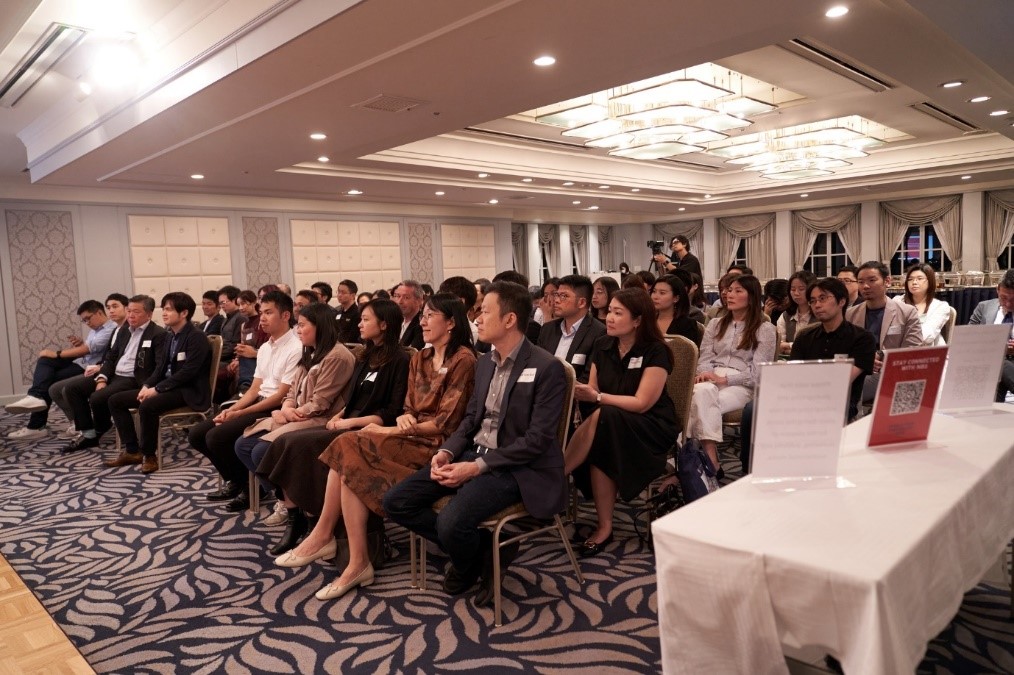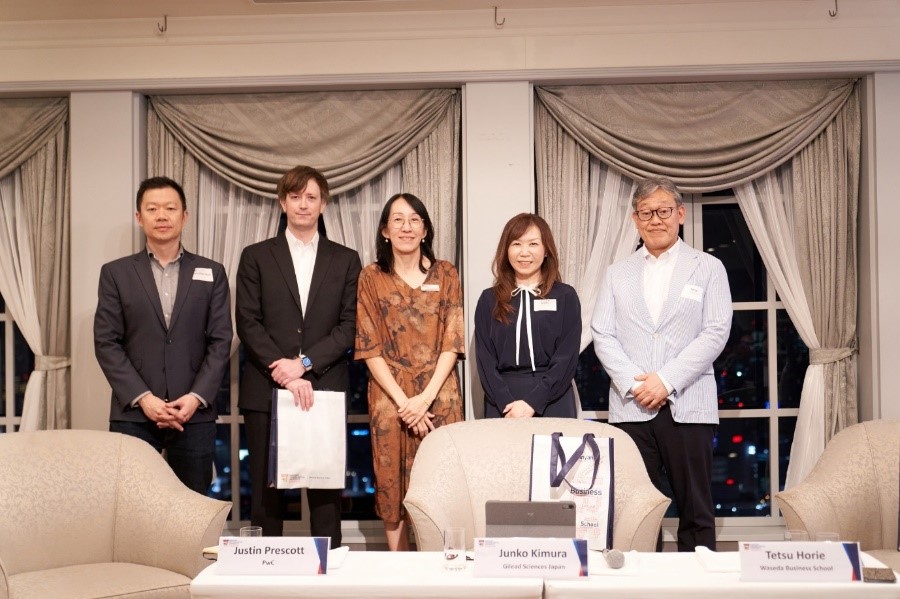AI’s Transformative Impact: An NBS Alumni Dialogue in Tokyo
Panellists discussed how AI is revolutionising industries and redefining the future.
As part of NBS’s ongoing commitment to alumni professional development, Assistant Dean for NBS Alumni Relations A/P Chung Lai Hong hosted an alumni dialogue in Tokyo on 17 May 2024 titled “Navigating the AI Frontier: Exploring the Transformative Influence of AI on Leadership and Careers”.
The event was moderated by Nanyang-Waseda Double MBA alumnus Mr Justin Prescott, Manager of Business Transformation Consulting at PwC. The panellists were Nanyang EMBA alumna and NBS Advisory Board Member Ms Junko Kimura, Head of Commercial Operations for Gilead Science Japan, and Nanyang EMBA alumnus Prof Tetsu Horie of Waseda Business School. The event brought together alumni, faculty, and students based in Japan to reconnect and keep up with the latest developments.
Speaking about NBS’s extensive and diverse network, Prof Chung said: “NBS has a strong network of international alumni members across the globe. Many industries have also stepped forward to offer support for our overseas alumni activities. I appreciate our alumni representatives in Japan for helping to organise this informative event and panel discussion.”
The panellists shared the strengths, weaknesses, opportunities, and threats of AI. They gave examples from healthcare, operations, education, and executive coaching. The discussion highlighted how individuals and leaders should adapt to the AI wave.
 More than 70 alumni and students attended the event in Tokyo on 17 May 2024
More than 70 alumni and students attended the event in Tokyo on 17 May 2024
Adoption of AI in Japan
According to the National Institute of Information and Communications Technology, AI will interpret five languages at the 2025 Osaka-Kansai Expo. Autonomous vehicles will also be deployed with AI capabilities.
However, in Japan at large, there is yet to be a sense of urgency among business executives to adopt AI. As such, Japanese businesses risk falling behind other countries such as the US, Singapore, and China given their active adoption of AI.
Impact of AI
While AI offers opportunities for those skilled in managing it, its reliance on data leads to biases and limits its ability to give clear answers.
Given these limitations, Ms Kimura explained how there continues to be a demand for jobs that require human ingenuity and mindfulness: “AI cannot replace our ability to make decisions and take risks. That includes doing the unconventional and moving beyond our comfort zones to dismantle good frameworks for fresh solutions. It cannot replace jobs that involve social interaction, collaboration with others, understanding emotions, and innovation.” People with the right attitude, skillsets, and abilities can stay ahead of the AI curve.
Leadership and AI
Leadership in the age of AI will be pivotal, requiring the strategic integration of AI to drive performance and innovation. Prof Horie described how business leaders need to learn to be visionaries to better navigate AI adoption, “Business leaders need a clear vision and open mind about adding AI to business processes. This will drive productivity, profitability, and aid business expansion. It means learning to manage change by adopting a growth mindset. It involves leading a cultural shift to create a more diverse workforce poised to push boundaries and achieve new possibilities.”
Business leaders will also need to adopt a consultative process to convince employees that AI is beneficial and here to stay. Management will need to provide positive opportunities for employees to experience its capabilities.
The session concluded with Q&A, offering further insights on implementing AI in businesses.

(From left) Prof Goh Kim Huat, Associate Dean, Graduate Studies; Mr Justin Prescott; A/P Chung Lai Hong; Ms Junko Kimura; and Prof Tetsu Horie
Watch the panel discussion here: https://youtu.be/nvIt9SgQQgI














/enri-thumbnails/careeropportunities1f0caf1c-a12d-479c-be7c-3c04e085c617.tmb-mega-menu.jpg?Culture=en&sfvrsn=d7261e3b_1)

/cradle-thumbnails/research-capabilities1516d0ba63aa44f0b4ee77a8c05263b2.tmb-mega-menu.jpg?Culture=en&sfvrsn=1bc94f8_1)



-(2).tmb-listing.png?Culture=en&sfvrsn=56fe6205_1)
.tmb-listing.png?Culture=en&sfvrsn=90e2f6dc_1)

-(4).tmb-listing.png?Culture=en&sfvrsn=76b767ea_1)